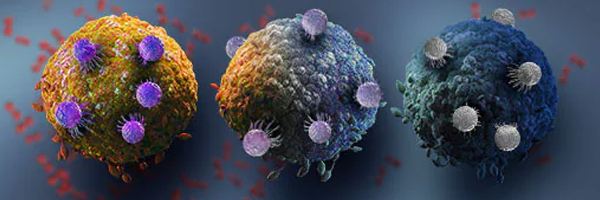Contact Us | 1-800-343-7475
Watch the first webinar in
Bio-Techne's Immuno-Oncology Series
While immune-based therapies have been approved for treatment of hematological malignancies, such as Acute Lymphocytic Leukemia (ALL), Chronic Lymphocytic Leukemia (CLL), and Non-Hodgkin Lymphoma (NHL), solid tumors have proven more challenging. One critical factor in this ongoing search for effective immunotherapy is the dynamic landscape of the tumor microenvironment (TME). Hypoxia is a common feature of the TME, as tumor growth often outpaces the blood supply. It is well established that hypoxic conditions contribute both to tumor metastasis and immunosuppression.
In this webinar, you will learn more about the complex relationship between hypoxia in the TME and immunotherapy. First, Dr. Greg M. Delgoffe will discuss how hypoxia driven metabolic changes in T cells can lead to T cell exhaustion and modulation of hypoxia can improve response to checkpoint blockade.
Then, Dr. James Arnold will share a strategy to improve cellular immunotherapy by exploiting the hypoxic TME.
 |
Greg M. Delgoffe, Ph.D. Member, Cancer Immunology and Immunology and Immunotherapy Program, UPMC Hillman Cancer Center |
||||
Dr. Delgoffe received his PhD from the Johns Hopkins School of Medicine and performed postdoctoral research at St. Jude Children’s Research Hospital. Research in the Delgoffe lab focuses on the role of metabolism in T cell fate and function, with a particular focus on the nutrient-restricted environment of cancer. Dr. Delgoffe seeks to uncover the metabolic pathways that drive T cell dysfunction within tumors and develop novel strategies to remodel the metabolic landscape of the tumor microenvironment to empower immune cells for anti-cancer function. |
|||||
 |
James Arnold, Ph.D.
Reader, School of Cancer and Pharmaceutical Sciences, King’s College London Leader, Tumor Immunology Group |
||||
Dr. Arnold received his PhD from Oxford University and completed his postdoctoral research at University of Cambridge. Research in the Arnold lab is focused on mechanisms of immunosuppression within the tumor microenvironment and improving cancer immunotherapy. |
|||||
Bio-Techne Immuno-Onocology Webinar Series 2022
Explore the complexities of the tumor microenvironment, giving insight into the latest discoveries and novel technologies aiding next-generation immunotherapies.
Look for invites to register for the upcoming webinars where you'll be able to ask our speakers the hard-hitting questions about the latest in Immuno-Oncology research, and learn more about this exciting field of cancer research.
| Month | Webinar Name | Speaker |
| March 2022 | Exploiting Tumor Hypoxia for Targeted Immunotherapy | Dr. Greg M. Delgoffe & Dr. James Arnold |
| April 2022 | Spatial organization of multicellular immune hubs in MMRd and MMRp colorectal cancer - Register Here | Dr. Jon Chen, MD |
| May 2022 | Title coming soon! | TBA |
| June 2022 | Title coming soon! | TBA |
